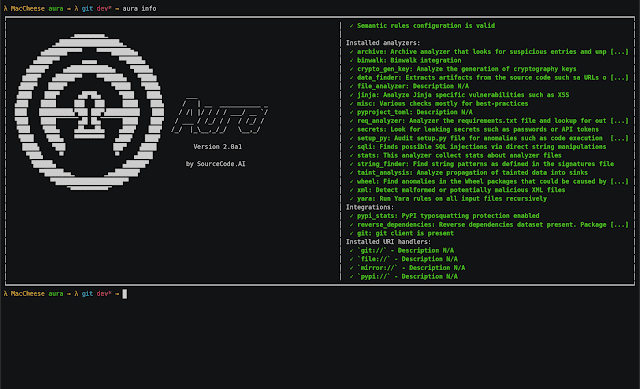Aura – Python Source Code Auditing And Static Analysis On A Large Scale

Aura is a static assessment framework formulated as a response to the ever-escalating menace of destructive offers and vulnerable code printed on PyPI.
Venture goals:
- give an automatic checking program above uploaded packages to PyPI, alert on anomalies that can either point out an ongoing assault or vulnerabilities in the code
- permit an corporation to conduct automated stability audits of the resource code and put into action safe coding procedures with a aim on auditing 3rd get together code such as python offer dependencies
- enable researches to scan code repositories on a large scale, generate datasets and perform assessment to further more progress investigate in the spot of susceptible and malicious code dependencies
Why Aura?
Though there are other tools with functionality that overlaps with Aura such as Bandit, dlint, semgrep and many others. the target of these alternatives is distinctive which impacts the operation and how they are currently being utilised. These possibilities are largely supposed to be used in a related way to linters, built-in into IDEs, often operate in the course of the progress which will make it critical to minimize untrue positives and reporting with distinct actionable explanations in suitable cases.
Aura on the other hand reviews on ** habits of the code**, anomalies, and vulnerabilities with as a lot details as achievable at the expense of fake constructive. There are a good deal of matters noted by aura that are not essentially actionable by a user but they convey to you a great deal about the behavior of the code this kind of as executing community conversation, accessing delicate data files, or employing mechanisms linked with obfuscation indicating a possible malicious code. By collecting this type of info and aggregating it together, Aura can be in comparison in features to other stability units these as antivirus, IDS, or firewalls that are primarily undertaking the very same examination but on a various variety of details (network interaction, functioning processes, and so forth).
Listed here is a fast overview of dissimilarities amongst Aura and other related linters and SAST tools:
-
- enter details:
-
- Other SAST tools – usually limited to only python (concentrate on) resource code and python model less than which the software is set up.
- Aura can review both equally binary (or non-python code) and python source code as very well. Able to examine a mixture of python code compatible with distinctive python variations (py2k & py3k) employing the identical Aura set up.
-
- reporting:
-
- Other SAST resources – Aims at integrating perfectly with other units these as IDEs, CI techniques with actionable outcomes even though striving to limit fake positives to avoid overwhelming end users with as well many non-significant alerts.
- Aura – studies as a great deal information and facts as attainable that is not straight away actionable such as behavioral and anomaly investigation. The output structure is developed for straightforward machine processing and aggregation rather than human readable.
-
- configuration:
-
- Other SAST resources – The equipment are good-tuned to the focus on project by customizing the signatures to focus on distinct technologies utilized by the focus on task. The overriding configuration is generally achievable by inserting feedback within the supply code this sort of as
# nosecthat will suppress the alert at that posture - Aura – it is predicted that there is tiny to no information in advance about the systems employed by code that is remaining scanned these kinds of as auditing a new python package for approval to be made use of as a dependency in a task. In most conditions, it is not even achievable to modify the scanned resource code this kind of as making use of reviews to suggest to linter or aura to skip detection at that site because it is scanning a duplicate of that code that is hosted at some distant location.
- Other SAST resources – The equipment are good-tuned to the focus on project by customizing the signatures to focus on distinct technologies utilized by the focus on task. The overriding configuration is generally achievable by inserting feedback within the supply code this sort of as
poetry set up --no-dev -E whole
Or just use a prebuild docker image sourcecodeai/aura:dev
docker operate -ti --rm sourcecodeai/aura:dev scan pypi://requests -v
Aura uses a so-named URIs to detect the protocol and location to scan, if no protocol is applied, the scan argument is addressed as a path to the file or directory on a area procedure.
Diff deals:
docker operate -ti --rm sourcecodeai/aura:dev diff pypi://requests pypi://requests2
Obtain most popular typosquatted deals (you require to simply call aura update to obtain the dataset to start with):
aura uncover-typosquatting --max-length 2 --restrict 10
Authors & Contributors
- Martin Carnogursky – First perform and job direct – https://is.muni.cz/individual/410345
- Mirza Zulfan – Emblem Style and design – https://github.com/mirzazulfan






